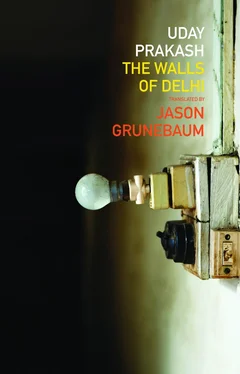‘I want a Chinese cap gun so I can kill the bad guy!’ Amar pleaded.
Shobha had earlier said no. But, number one, just yesterday, she received 2,200 rupees from the Kalpana Boutique Garments Centre, part in advance, the rest on receipt. And, number two, Bimla Sahu and her yelling and screaming had put her and the kids in a really foul mood, and she thought the kids might feel better if they got to play around. Therefore, she decided to purchase a cap gun. She went up to the railing, leaned over, and shouted to the hawker. ‘Hey mister! Don’t move, I’m coming right down.’
Shobha was just about to go down the stairs when she heard Suri’s cold, hard, machine-like voice.
‘Mummy, I want a cap gun, too. My own.’
Shobha turned around to find Suri pressed against the railing, standing and looking at her with the big head held up by his shoulders.
‘Are you just a little kid who likes to play guns?’ she said with a sweet smile.
She reached their flat (C-7/3) on the third floor, unlocked it, went in, took money from the pouch inside the cabinet drawer, and took the stairs down to the ground floor.
When she got there, she bought the Chinese pistol from the hawker for fifteen rupees. She tried and tried to bargain, but he wouldn’t even drop the price one rupee. Shobha thought, they’re not going to drop the price of these things that are selling like hotcakes. She took the gun, went up the stairs, and, when she got to their flat, found Amar who had come down from the roof. You could see on his face how happy and excited he was. He grabbed the cap gun at once and rushed back upstairs. Shobha shouted after him.
‘Be sure to let your brother play with it, too! Don’t play on your own.’
‘It’s mine, mine!’ Amar shot back while running.
Shobha went into the kitchen. The pressure cooker with the channa dhal sat atop the gas burner. They purchased a gas burner after moving to Ambedkar Nagar from Jahangirpuri, retiring the old coal stove, though there were still plenty of families in the Janta Flats who still cooked with coal or kerosene.
Today for lunch she was planning to serve the channa dhal and ghiya dish that she, Suri, Amar, and Chandu all really liked. She learned the recipe in Jahangirpuri from Natho Chaudhuri, who had left her alcoholic husband in Bijnor and run away with her lover to Delhi. She called the dish ‘luckdala.’ Maybe she got ‘luck’ from the vegetable ‘loki’ and ‘dala’ from ‘dhal,’ and combined the two to come up with this cute name. She thought she would wait until the pressure cooker had let off all its steam so she could go back to her sewing on the roof without worrying. There were still ten or so minutes before noon. She turned the gas up on the burner.
One minute later the cooker gave off its first steam whistle — a long, throaty blast. There was probably still plenty of steam bottled up inside. The strong burst of vapor carried spicy, delicious smells throughout the kitchen, smells that made Shobha’s mouth water. But still five more whistles to go.
Just as the second whistle was about to blow, she heard a loud commotion outside. Women and children, screaming and shrieking, the sounds of people running downstairs.
Shobha froze. Something terrible had happened. She first thought of Amar and was seized by fear.
She turned off the burner and started fast for the roof. She thought about what Suri said just after she called after the hawker, Mummy, I want a cap gun, too. My own, in that cold, hard, machine-like voice, eyes red, head trembling, that look of wildness on his face, just like when he took Amar’s tiffin box to eat in the park, and got in a fight with Amar, and if she hadn’t broken it up Suri would have strangled his little brother.
And now if Suri had pushed Amar off the roof?
‘Amar! Amar!’ she shouted, arriving on the roof in bad shape.
Amar clung to the railing as if he were made of stone, sobbing quietly, holding the Chinese cap gun in one hand.
The women still on the roof leaned over the railing and stared down.
Shobha looked. There was a crowd of people gathered around the spot where just moments earlier the hawker had stood with his bike. More people came running from adjacent apartment buildings.
Bimla Sahu, the one who everyone called ‘toughie’ or ‘the wrestler’ since she was big and strong and always picking fights came up behind Shobha, put her hand on her shoulder, and she was in tears.
‘He went up to the railing himself and just jumped. It happened so quickly.’
Her face was covered in tears and she was choking on her sobs. ‘Your eldest committed suicide! You and I said one little thing, and look how he took it to heart.’
***
The women said Amar came back to the roof with his cap gun, and as soon as he fired the first shot, Suri began to have trouble breathing. He grabbed his head with his hands, and tottered over to the edge.
And from there he jumped quietly.
***
On Nigambodh ghat, Chandrakant set fire to his son Suri’s body. After the flames rose and began engulfing the body, I turned away.
An old fakir was sitting a little distance behind us, wrapped up tight under a dirty, old, torn, bed sheet. It had been a cold December, and all of North India was under a cold snap that had already killed a handful of poor people. The old fakir was shivering.
It was the same old fakir Chandrakant and I had met years earlier in the Hazarat Nizammuddin dargah near the shrine to the first Hindi poet, Amir Khusrau, a fakir whose eyes were red like an ant’s, whom the almighty did not bless with the ability to sleep, who carried thirty times its own weight its whole life.
He noticed me staring at him and got up to leave. I saw that his head was proportionally much larger than his body — something he was always trying to hide with that torn old bedsheet. FINALLY AN ASSESSMENT BY THE WHO; A PAGE FROM SURYAKANT’S DIARY; THE PENTAGON
Suri — Suryakant — was born sometime in September, 1995, and died on 25 December, 2004, at 12:04. He was born in a private hospital called Kalpana Health Centre between Model Town and Adarsh Nagar, but determining the exact date is no easy task, because a restaurant, day spa, and massage parlour now stand where the hospital used to be. Nobody has any idea what happened to Kalpana Health Centre. People had of course heard of the big scandal and police raid a couple years ago that had made the TV news after the kidney of an indigent man had been removed and sold.
I couldn’t be sure whether nine months before his birth in that hospital when Suryakant came into his mother’s womb was the time of the magic carpet, the one Chandrakant and Shobha had brought with them to the half flat of house number E-3/1, bylane number seven, Jahangirpuri, Delhi, after fleeing Sarini, and had put on the floor, and played the game they played for years to put out the fire; or whether it was true that one night he crawled like a turtle out of the dirty drainage sewer and silently entered his mother’s womb that way. And the disease that made his head grow and grow, day by day, the disease the doctors said would give him a life span of two years max, the disease that had no trace in any of the medical literature, the disease Chandrakant and Shobha called ‘Mangosil’ but it was really only Suri who knew about the virus that caused it — it wasn’t the disease that caused his death.
He himself chose when to end his life.
***
Suri’s notebook lies open in front me at page fifty-six. He had copied down some lines of a poem in his beautiful handwriting:
You are still alive, you are not alone yet —
She is still beside you, with her empty hands,
And joy reaches you both across immense places,
Читать дальше










